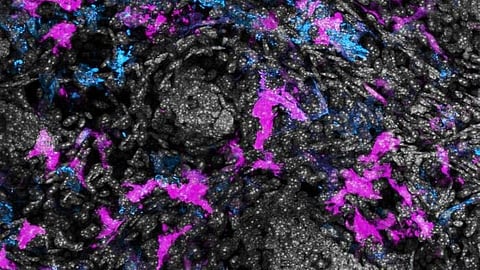

The team of Prof. Alain Vanderplasschen, virologist and immunologist at the University of Liège, has published an article in the journal Nucleic Acids Research, reporting ten years of research on how a carp virus has been using a protein domain called Zalpha (Zα) to inhibit the defence mechanisms of the host cell. Importantly, this discovery has consequences on our understanding of the functions of important Zα domain containing proteins of the immune system.
One of the fascinating aspects of scientific research is certainly the serendipity that comes with it, which is something the team of Prof. Alain Vanderplasschen, virologist and immunologist at the FARAH (Faculty of Veterinary Medicine) of the University of Liège can only agree with. His team has just published in the prestigious journal Nucleic Acids Research(1) the results of ten years of research on the study of an original protein of a carp virus.
"This scientific project began more than ten years ago when researchers in Lisbon discovered that a carp virus - the Cyprinid herpesvirus 3 or CyHV-3 - had stolen a cellular gene coding for a protein domain called Zα during the course of evolution. It is s a virus that we know very well here at the University of Liège because we have been studying it for many years." explains Alain Vanderplasschen.
The Zα domain allows proteins that possess it to recognise double-stranded DNA or RNA in a rare conformation different from that described by Watson and Crick in 1953. In fact, the Zα domain specifically recognises nucleic acids when the double helix exhibits a left-handed conformation instead of a right-handed conformation. This Zα domain is found in important proteins of the immune system of many animals including humans. These proteins are involved in important and diverse pathological processes such as cancers, genetic diseases and autoimmune diseases. By studying the functions of the Zα domain of the carp virus, we discovered that it possesses properties that were previously unknown for the Zα domains of cellular proteins” says Alain Vanderplasschen.
Remarkably, by genetically engineering the Zα domain of the virus into the Zα domains of cellular proteins from various animal species and humans, the researchers found that the new properties discovered for the Zα of the carp virus were present in some cellular proteins. This study, conducted by researchers from ULiège and published today, broadens the functional diversity of Zα domains and stimulates new hypotheses concerning the mechanisms of action of proteins containing Zα domains. It is a discovery that opens new perspectives on the mechanisms of action of Zα domain-containing proteins involved in serious pathologies. (SP/Newswise)
Join MedBound - an ecosystem for students and professionals of medical and health sciences.
